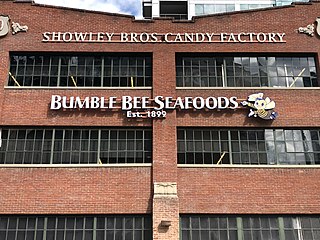 W
WAstoria is a port city and the seat of Clatsop County, Oregon, United States. Founded in 1811, Astoria is the oldest city in the state of Oregon and was the first American settlement west of the Rocky Mountains. The county is the northwest corner of Oregon, and Astoria is located on the south shore of the Columbia River, where the river flows into the Pacific Ocean. The city is named for John Jacob Astor, an investor and entrepreneur from New York City, whose American Fur Company founded Fort Astoria at the site and established a monopoly in the fur trade in the early nineteenth century. Astoria was incorporated by the Oregon Legislative Assembly on October 20, 1876.
 W
WAt about 2 a.m. on December 8, 1922, a fire began which destroyed up to 30 blocks in central Astoria, Oregon. Approximately 2,500 residents lost their homes, with one death, and damages exceeded hundreds of millions of dollars. The fire is considered to be one of the worst in Oregon's history.
 W
WAstoria Regional Airport is a joint civil-military public airport in Warrenton, three miles southwest of Astoria, in Clatsop County, Oregon. The airport is owned by the Port of Astoria and is the home of Coast Guard Air Station Astoria.
 W
WThe Astoria Riverfront Trolley is a 3-mile (4.8 km) heritage streetcar line that operates in Astoria, Oregon, United States, using former freight railroad tracks along or near the south bank of the Columbia River, with no overhead line. The service began operating in 1999, using a 1913-built streetcar from San Antonio, Texas. As of 2012, the service was reported as carrying 35,000 to 40,000 passengers per year and has been called a "symbol" and "icon" of Astoria. The line's operation is seasonal, normally during spring break and from May through September.
 W
WBumble Bee Foods, LLC, is a company that produces canned tuna, salmon, other seafoods, and chicken under the brand names "Bumble Bee," "Wild Selections," "Beach Cliff," "Brunswick," and "Snow's." The company is headquartered in San Diego, California, United States. The brand is marketed as Clover Leaf in Canada. It is owned by FCF Co, Ltd. of Taiwan.
 W
WCoquille was a steamboat built in 1908 for service on the Coquille River and its tributaries. Coquille served as a passenger vessel from 1908 to 1916, when the boat was transferred to the lower Columbia River. Coquille was reconstructed into a log boom towing boat, and served in this capacity from 1916 to 1935 or later.
 W
WThe Astorian is a newspaper, published in Astoria, Oregon, United States, established nearly 148 years ago in 1873, and in publication continuously since then. The paper serves the Astoria, Warrenton, Seaside area, the Long Beach Peninsula, and surrounding areas. The newspaper is published Monday through Friday and has a circulation of approximately 8,400. It is owned by EO Media Group, of Pendleton, Oregon.
 W
WOcean Wave was a steamboat that was operated from 1891 to 1897 on the Columbia River, from 1897 to 1899 on Puget Sound and from 1899 to 1911 as a ferry on San Francisco Bay. Ocean Wave is perhaps best known for transporting summer vacationers from Portland, Oregon to seaside resorts near Ilwaco, Washington during its service on the Columbia River. This vessel is also known for being the first ferry placed in service by the Atchison, Topeka and Santa Fe Railway.
 W
WThe Pacific Fur Company (PFC) was an American fur trade venture wholly owned and funded by John Jacob Astor that functioned from 1810 to 1813. It was based in the Pacific Northwest, an area contested over the decades between the United Kingdom of Great Britain and Ireland, the Spanish Empire, the United States of America and the Russian Empire.
 W
WSue H. Elmore was a steamboat built for service on the coast of Oregon and southwest Washington. From 1900 to 1917, the vessel's principal route ran from Portland, Oregon down the Columbia River to Astoria, and then west across the Columbia Bar, then south along the Oregon coast to Tillamook Bay. Once at Tillamook Bay, Sue H. Elmore was one of the few vessels that could reach Tillamook City at the extreme southern edge of the mostly very shallow bay. After this Sue H. Elmore was sold, being operated briefly in Puget Sound under the name Bergen, and then for many years, out of San Diego, California as a tugboat under the name Cuyamaca. During World War II Cuyamaca was acquired by the U.S. Army which operated the vessel as ST-361. Afterwards the army sold ST-361 and the vessel returned to civilian ownership, again under the name Cuyamaca. In 1948 Cuyamaca sank in a harbor in Venezuela, but was raised and by the early 1950s, was owned by one A. W. Smith, of Pensacola, Florida. This vessel's former landing place in Tillamook, Oregon is now a municipal park named after the ship.
 W
WTonquin was a 290-ton American merchant ship initially operated by Fanning & Coles and later by the Pacific Fur Company (PFC), a subsidiary of the American Fur Company (AFC). Its first commander was Edmund Fanning, who sailed to the Qing Empire for valuable Chinese trade goods in 1807. The vessel was outfitted for another journey to China and then was sold to German-American entrepreneur John Jacob Astor. Included within his intricate plans to assume control over portions of the lucrative North American fur trade, the ship was intended to establish and supply trading outposts on the Pacific Northwest coast. Valuable animal furs purchased and trapped in the region would then be shipped to China, where consumer demand was high for particular pelts.
 W
WThe Western Workman's Co-operative Publishing Company, established in 1907, was a Finnish-language socialist newspaper and book publisher located in Astoria, Oregon, on the Pacific coast of the United States of America. The firm produced the newspapers Toveri, Toveritar, periodicals designed for young readers, as well as books.